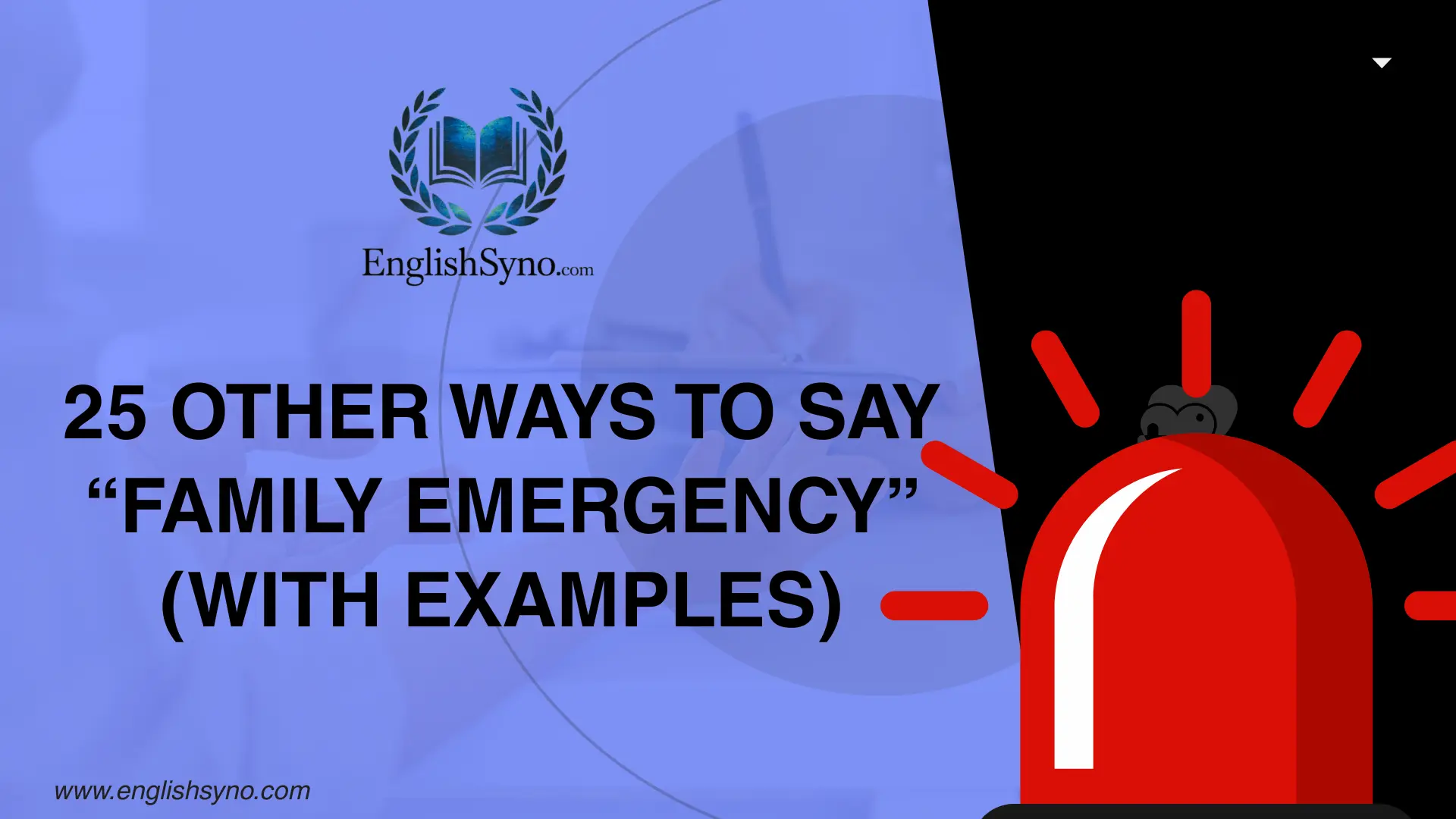When a family emergency arises, an unexpected and critical event can impact a family and a member’s health, safety, and well-being, requiring immediate attention, time off work, and often necessitating developing a clear plan with proper communication, identifying escape routes, a meeting spot, and a designated kit.
A domestic situation may involve any family affair, problem, matter, issue, or thing, from family business to troubles, crisis, difficulties, stuff, dysfunction, or marital matters. Each story or history in the household can lead to turmoil and internal conflict at home, so recognizing and addressing these challenges early is crucial for stability.
What Does “family emergency” Mean?
A family emergency refers to an unexpected, urgent situation involving a family member’s health, safety, or well-being that requires immediate attention. Examples include sudden illness, accidents, or crises at home. Using clear language helps convey the seriousness while showing respect for the people involved.
When to Use “family emergency”
Use family emergency when you need to communicate urgency related to a family situation. It’s appropriate in both professional and personal contexts, such as notifying work about time off or explaining your sudden unavailability to friends or colleagues.
Is It Professional/Polite to say “family emergency”?
Yes. Saying family emergency is generally professional and polite, especially in workplace communication. However, using alternative phrasing can add warmth and empathy, making the message more relatable and less abrupt.
Pros or Cons
Pros: Conveys urgency, universally understood, and professional.
Cons: Can feel impersonal or abrupt; may not convey emotional nuance or care.
Urgent Family Matter
Meaning/Definition: Refers to a critical situation concerning a family member that needs immediate attention.
Detailed Explanation: This phrase emphasizes urgency while slightly softening the tone compared to “emergency.” It signals the importance without being alarming.
Example: “I won’t be able to attend the meeting today due to an urgent family matter that requires my presence.”
Best Use: Workplace emails, polite notifications, and slightly formal situations.
Worst Use: Casual conversations where empathy and warmth are key.
Tone: Polite, urgent, respectful
Personal Family Crisis
Meaning/Definition: A serious, unexpected event in the family that significantly impacts your availability or attention.
Detailed Explanation: Adds emotional weight to the situation, making it clear that it’s a significant personal challenge.
Example: “I’m unable to join the conference call today due to a personal family crisis.”
Best Use: Professional or semi-formal communications where context matters.
Worst Use: Casual messaging where a simpler phrase works better.
Tone: Empathetic, serious, professional
Domestic Emergency
Meaning/Definition: A sudden, urgent situation at home requiring immediate intervention.
Detailed Explanation: Focuses on the home environment, encompassing anything from accidents to health crises, giving a neutral but urgent tone.
Example: “Please excuse my absence; a domestic emergency has come up that I must handle immediately.”
Best Use: Emails, formal messages to supervisors or teams.
Worst Use: Informal texting to friends; may sound stiff.
Tone: Formal, urgent, neutral
Immediate Family Issue
Meaning/Definition: A sudden problem involving a close family member that needs prompt attention.
Detailed Explanation: Highlights urgency and closeness of the family connection, showing responsibility without being alarming.
Example: “I’m sorry I can’t attend the training today due to an immediate family issue.”
Best Use: Work emails, polite notifications.
Worst Use: Casual texts; can sound formal.
Tone: Serious, respectful, urgent
Critical Family Situation
Meaning/Definition: A serious and pressing scenario affecting a family member.
Detailed Explanation: Conveys high stakes and seriousness, emphasizing the critical nature of the event.
Example: “I have to leave town suddenly for a critical family situation that requires my attention.”
Best Use: Formal messages, professional communications.
Worst Use: Overused in casual conversation; may sound dramatic.
Tone: Urgent, professional, serious
Urgent Domestic Concern
Meaning/Definition: A home-related emergency demanding immediate attention.
Detailed Explanation: Focuses on the domestic aspect, allowing clarity for work or formal messaging without specifying personal details.
Example: “I won’t be in the office today due to an urgent domestic concern.”
Best Use: Workplace emails or managers.
Worst Use: Texting close friends; may feel stiff.
Tone: Professional, formal, urgent
Family Health Emergency
Meaning/Definition: A sudden health problem affecting a family member.
Detailed Explanation: Makes the health aspect explicit, adding gravity and understanding to your communication.
Example: “I need to leave immediately because of a family health emergency.”
Best Use: Professional or semi-formal communication.
Worst Use: Casual conversations where simpler phrasing is sufficient.
Tone: Serious, empathetic, urgent
Unexpected Family Event
Meaning/Definition: A surprising occurrence in the family that demands attention.
Detailed Explanation: Neutral and less alarming, focuses on the unexpected nature of the event.
Example: “I apologize for missing the call due to an unexpected family event.”
Best Use: Casual or semi-formal updates.
Worst Use: Formal work notifications where urgency must be emphasized.
Tone: Neutral, polite, considerate
Immediate Family Matter
Meaning/Definition: A pressing issue in the family requiring attention right away.
Detailed Explanation: Similar to an urgent family issue but slightly softer in tone; suitable for professional or polite contexts.
Example: “Please excuse my absence; an immediate family matter has come up.”
Best Use: Workplace emails, polite messages.
Worst Use: Casual text; may sound formal.
Tone: Respectful, serious, neutral
Personal Domestic Crisis
Meaning/Definition: A significant and urgent personal situation at home affecting family members.
Detailed Explanation: Highlights both the personal and domestic impact, conveying empathy and urgency.
Example: “I won’t be available this afternoon due to a personal domestic crisis.”
Best Use: Professional and semi-formal situations.
Worst Use: Overly dramatic if used in casual chats.
Tone: Serious, empathetic, urgent
Family Urgency
Meaning/Definition: A pressing family issue that needs quick attention.
Detailed Explanation: Short and simple; conveys urgency without overexplaining.
Example: “I have a family urgency and must leave immediately.”
Best Use: Quick notifications to supervisors.
Worst Use: Casual conversations; may seem abrupt.
Tone: Direct, urgent, professional
Critical Domestic Event
Meaning/Definition: A highly important home event requiring immediate action.
Detailed Explanation: Puts emphasis on seriousness and domestic setting.
Example: “I need to handle a critical domestic event and won’t be available.”
Best Use: Professional updates, work emails.
Worst Use: Casual texting; may feel formal.
Tone: Formal, urgent, serious
Unexpected Family Problem
Meaning/Definition: A sudden challenge in the family needing attention.
Detailed Explanation: Slightly softer than “emergency”; suitable for both work and personal contexts.
Example: “Sorry, I can’t join today due to an unexpected family problem.”
Best Use: Polite workplace messages, semi-formal communication.
Worst Use: Overused in casual chats; may sound repetitive.
Tone: Neutral, considerate, polite
Home Crisis
Meaning/Definition: A crisis occurring at home affecting family members.
Detailed Explanation: Direct and serious, often indicating urgent action is required.
Example: “I won’t be available because of a home crisis that needs immediate attention.”
Best Use: Professional and semi-formal messages.
Worst Use: Overly blunt for casual conversation.
Tone: Serious, urgent, professional
Family Trouble
Meaning/Definition: A problem affecting the family that requires attention.
Detailed Explanation: Neutral, slightly informal; can be used in both personal and work contexts.
Example: “I have some family trouble to address and need to step away.”
Best Use: Casual or semi-formal communication.
Worst Use: Too vague for urgent situations.
Tone: Neutral, empathetic, polite
Personal Family Challenge
Meaning/Definition: A difficult situation involving a family member requiring focus.
Detailed Explanation: Adds a sense of personal engagement and responsibility.
Example: “I’m addressing a personal family challenge and won’t be available today.”
Best Use: Semi-formal or personal communication.
Worst Use: Too formal for casual texts.
Tone: Serious, empathetic, thoughtful
Urgent Domestic Matter
Meaning/Definition: A time-sensitive issue at home needing immediate attention.
Detailed Explanation: Focuses on urgency and domestic context without being overly dramatic.
Example: “I have an urgent domestic matter to attend to and must leave now.”
Best Use: Work emails, polite notifications.
Worst Use: Casual chats; may sound stiff.
Tone: Professional, urgent, neutral
Immediate Household Issue
Meaning/Definition: A problem arising at home that requires prompt attention.
Detailed Explanation: Highlights the household context and emphasizes timeliness.
Example: “I’m unavailable due to an immediate household issue.”
Best Use: Professional or formal messages.
Worst Use: Informal texting; may feel impersonal.
Tone: Formal, direct, professional
Sudden Family Crisis
Meaning/Definition: An unexpected and urgent event affecting family members.
Detailed Explanation: Stresses both suddenness and critical impact, conveying urgency clearly.
Example: “I cannot attend the meeting due to a sudden family crisis.”
Best Use: Workplace or formal communication.
Worst Use: Overused in casual messaging.
Tone: Serious, urgent, professional
Family Health Matters
Meaning/Definition: A health-related issue affecting a family member requiring attention.
Detailed Explanation: Specifies the nature of the emergency, adding clarity and seriousness.
Example: “I have a family health matter that I need to handle immediately.”
Best Use: Professional, semi-formal updates.
Worst Use: Vague in casual conversation; less urgent tone.
Tone: Serious, empathetic, professional
Critical Household Situation
Meaning/Definition: A serious situation at home that demands immediate action.
Detailed Explanation: Emphasizes seriousness and urgency within the household.
Example: “I won’t be available today due to a critical household situation.”
Best Use: Workplace or formal notifications.
Worst Use: Casual texting; too formal.
Tone: Serious, formal, urgent
Family Emergency Situation
Meaning/Definition: A pressing and urgent family event affecting your availability.
Detailed Explanation: A slightly longer version of “family emergency” emphasizes clarity and urgency.
Example: “I’m dealing with a family emergency and cannot attend the meeting.”
Best Use: Workplace or professional updates.
Worst Use: Informal texts; can sound stiff.
Tone: Formal, urgent, professional
Personal Domestic Issue
Meaning/Definition: A private problem at home requiring attention.
Detailed Explanation: Highlights both personal involvement and domestic context.
Example: “I am addressing a personal domestic issue and need to step away.”
Best Use: Semi-formal communications, polite notifications.
Worst Use: Casual texting; may sound formal.
Tone: Thoughtful, professional, neutral
Household Emergency
Meaning/Definition: A sudden and urgent incident at home affecting family members.
Detailed Explanation: Clear and direct, conveys urgency and seriousness.
Example: “I need to leave immediately due to a household emergency.”
Best Use: Formal notifications, workplace emails.
Worst Use: Casual messages; may feel abrupt.
Tone: Serious, urgent, professional
Marital or Family Crisis
Meaning/Definition: A serious issue involving marriage or family requiring urgent attention.
Detailed Explanation: Specifies the type of family emergency, adding clarity and emotional context.
Example: “I’m handling a marital or family crisis and cannot participate today.”
Best Use: Professional or personal communication with clear context.
Worst Use: Overly casual messaging; may sound heavy.
Tone: Serious, empathetic, professional
Final Thoughts
Choosing the right words when communicating a family emergency can make a meaningful difference in how your message is received. Using alternatives to the standard phrase allows you to convey urgency, care, and empathy, while maintaining professionalism or warmth depending on the context. Whether you’re writing to your employer, colleagues, friends, or family, the phrasing you choose can influence how your situation is perceived and how supportive responses are offered.
For example, phrases like urgent family matter or personal family crisis signal the seriousness of the situation while sounding thoughtful and polite. Others, such as domestic emergency or household emergency, are more neutral and professional, ideal for formal communication. Meanwhile, softer alternatives like unexpected family event or family trouble communicate concern without causing unnecessary alarm.
Being intentional with language helps manage expectations, avoid miscommunication, and encourages understanding. It also demonstrates emotional intelligence, as you acknowledge the seriousness of the event while respecting the listener or reader. Preparing a family emergency plan in advance, combined with thoughtful phrasing, ensures both your responsibilities and your communication remain effective. Ultimately, mastering these alternatives not only improves clarity but also strengthens relationships, showing care and consideration in times of difficulty.
FAQs
What is a family emergency?
A family emergency is an unexpected situation involving a family member’s health, safety, or well-being that requires immediate attention, such as illness, accident, or crisis.
How do I tell my boss about a family emergency?
Use professional phrases like urgent family matter or domestic emergency, explain briefly, and request necessary time off politely.
Can “family emergency” be used in casual texts?
Yes, but softer alternatives like unexpected family event or family trouble may sound more personal and empathetic.
Is it professional to say “family emergency”?
Yes. It is clear, polite, and widely understood, especially in workplace communications.
How urgent does a family emergency need to be?
A family emergency typically requires immediate attention that cannot be postponed without affecting the family member’s well-being.
What’s the difference between a family emergency and a family issue?
A family emergency is urgent and critical; a family issue may not require immediate action and can be less serious.
Can I use “personal family crisis” at work?
Yes, it’s professional and communicates seriousness without revealing private details.
How do I politely notify colleagues about a family emergency?
Use phrases like urgent family matter or immediate family issue, keep it brief, and mention your expected absence.
What alternatives are suitable for formal emails?
Domestic emergency, household emergency, and critical family situation work well in professional contexts.
Are there informal ways to express family emergencies?
Yes, family trouble or unexpected family events are warmer and softer for friends or casual contacts.
Should I explain the details of the family emergency?
No, brief phrases are preferred to maintain privacy while conveying urgency.
How do I manage time off for a family emergency?
Inform your supervisor promptly, provide necessary context using professional phrasing, and coordinate coverage if needed.
Can multiple phrases be combined?
Yes, phrases like personal domestic crisis or marital or family crisis can provide clarity and emotional context.
Is it okay to reschedule appointments due to a family emergency?
Absolutely. Using thoughtful phrasing ensures understanding and maintains professionalism.
Why is choosing the right words important?
The correct wording balances clarity, empathy, and urgency, helping others respond appropriately while respecting the situation.

Muhammad Altaf is an English language specialist and professional content strategist with over 10 years of experience writing and teaching practical English usage, professional communication, and tone awareness. His work focuses on helping readers express ideas clearly, naturally, and confidently in real-world contexts.


